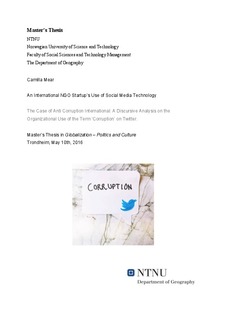| dc.description.abstract | Social media technologies today play a central part in our societies at large, but also within organizations. As such, it is both of relevance and importance to look at how organizations use social media technologies. Presented as a case within this larger topic, this study aimed at researching an international NGO startup’s use of social media technology – more specifically, by doing a discursive analysis on the organizational use of the term term ‘corruption’ on Twitter. Chapter 1: Introduction elaborates more on this.
In Chapter 2 and 3 a context through which to interpret any findings within the analysis was provided, firstly by taking a closer look at the featured organization, Anti Corruption International, followed by a global context in which the organization operates within, namely that of a globalizing world. The type of organization that Anti Corruption International can be defined as was then looked at, thus providing an overview of some of the features characterizing international NGO startups. This overview is followed by a presentation of the global problem that the organization is working towards eradicating, namely that of ‘corruption’ which also happens to be the term investigated in the discursive analysis of the organization’s use of the said term on Twitter. Following this came a presentation of some perspectives on reasons as to why organizations might use social media technologies.
With this context in mind, the discursive analysis was conducted assisted by the social media capturing software, Chorus. The software which is designed to capture Twitter discourse, provided a visual analysis of some structural patterns that the programme could observe within the dataset collected. The programme showed some terms to be co-occuring more strongly with the term ‘corruption’ than other terms. What could be interpreted by this, was that not only did the organization use the term ‘corruption’ on Twitter as a means of broadcasting information and encouraging for social interaction with its target group (a young, international audience), it could also be interpreted as to show that the organization used the term ‘corruption’ in order to call for action by joining the organization and its cause. Furthermore, the co-occurring terms also made for an interpretation of the organization using the term ‘corruption’ in a manner that re-produced itself as an entity, by constructing its identity as an anti-corruption organization working towards the eradication of corruption.
The reasons as to why this particular research topic was chosen mainly had to do with this particular topic being regarded as valuable to the organization, seeing as no prior research had been done concerning the organization’s use of social media technologies broadly, or the organization’s use of the significant term ‘corruption’ more specifically. As such, the aim of this research was to provide the organization with some insights into a segment of its social media practices – insights that the organization could build on and apply in order to fill the slightly innocent, yet oblivious void that the organization finds itself within due to a deficiency of knowledge and insight concerning its current use of social media technologies. For fledgling organizations and sustainable organizations alike, unawareness concerning the organization’s use of social media technologies is not exactly seen as to be beneficial to the organization, seeing as social media technologies can impact organizations in unforeseeable ways.
Thus, this study might serve to address a segment within the knowledge gap that exists within the featured organization concerning its use of social media technologies. The interpretations made within the study might serve to create the basis for further studies to be carried out by the organization itself on this particular topic. Additionally, comprehensions of social media practices within organizations such as international NGO startups, even small segments of their use, serves to identify trends in usage, which further serves to provide an understanding of how new technologies such as these can be leveraged to fulfill the global objectives of an international NGO startup, and at large, providing a deeper understanding of the purpose of using social media technologies within organizations. | nb_NO |
